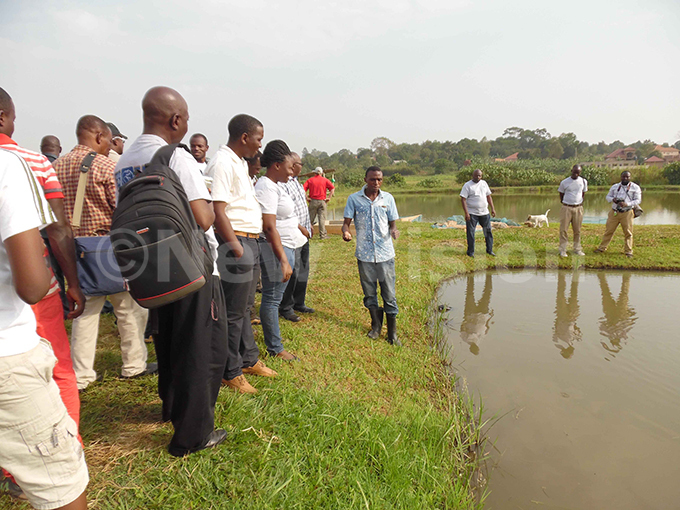Expensive, adulterated fish feeds threaten fish industry
Jan 23, 2017
Ssentongo Martin, Marjorie Fish Farm in Mukono Kiwanga deals in urban fish rearing for tilapia and catfish says the challenge is the adulterated fish feeds on the market.

Makerere University Department of Natural Resources, Economics and Agribusiness and United States a collaborative Research funded by the US Agency for International Development (USAID), Aqua Fish Innovation Lab have started the assessment of the fish farms in Uganda to design ways to improve the industry to the level of other African countries.
Hillary Egna,Director Aqua Fish Innovation Lab said the primary objective is to lower costs of doing the fish farming activity for local farmers.

Egna said they want to provide a solution to one of the biggest challenges facing local fish farmers of high cost of feeds for fish and also providing other alternatives like sun drying and solar lantern for preserving fish and marketing fish for both regional and international buyers.
"Right now our innovation is around feed technologies, feed conversion ratios," Hillary noted.
She noted that there is need to adopt the best agricultural practices to have the aqua industry much developed compared to Kenya and Nigeria. The practices include profiling the quality of Uganda's water to increase fish production and reproductive systems of oily lung fish.
The farms visited 3 fish farms that included IG investment at Busaana Landing site in Buikwe district, Marjorie Fish Farm in Kiwanga Mukono district and Jinja Fish Farmers Association in Jinja municipality.
Department of Natural Resources, Economics and Agribusiness Makerere University Associate Professor Theodora Hyuha said they want to carry out capacity building of fishermen and institutional strengthening and development in order to have the industry develop.
"Our interest is to find out whether fishing industry is a profitable business activity," Hyuha said.
"We have our real sensitivity on scaling up commercializing our activities and technologies," Hillary said. We don't work necessarily for subsistence, we work with startups, small holder farmers and medium," she added.
She said they will be conducting training is around feed technologies, using naturally available inputs for instance fresh water ponds and sunlight and other cheap methods of doing business.
Beneficiary farmers
Ssentongo Martin, Marjorie Fish Farm in Mukono Kiwanga deals in urban fish rearing for tilapia and catfish says the challenge is the adulterated fish feeds on the market. This necessitates investing in our own production.
Nastah Namasinga, Operations Manager,IG investment Uganda Limited they are now turning to alternative sources such as soya beans,mukene,blackmeal ,sun flower and blood.
"Each of them has an advantage. But time after time we change the formula," Namasinga explained.
IG investment has around 20 cages of 20metres wide and 4.9 in depth at Busaana landing site in Buikwe that produce in between 130-150 tons though the target is 300tons.
